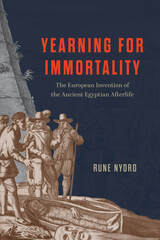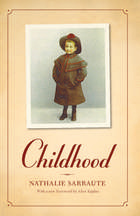
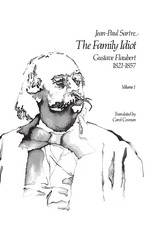
"A man is never an individual," Sartre writes, "it would be more fitting to call him a universal singular. Summed up and for this reason universalized by his epoch, he in turn resumes it by reproducing himself in it as singularity. Universal by the singular universality of human history, singular by the universalizing singularity of his projects, he requires simultaneous examination from both ends." This is the method by which Sartre examines Flaubert and the society in which he existed.
Now this masterpiece is being made available in an inspired English translation that captures all the variations of Sartre's style—from the jaunty to the ponderous—and all the nuances of even the most difficult ideas. Volume 1 consists of Part One of the original French work, La Constitution, and is primarily concerned with Flaubert's childhood and adolescence.
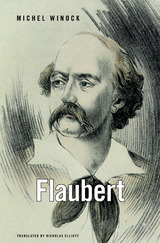
Michel Winock’s biography situates Gustave Flaubert’s life and work in France’s century of great democratic transition. Flaubert did not welcome the egalitarian society predicted by Tocqueville. Wary of the masses, he rejected the universal male suffrage hard won by the Revolution of 1848, and he was exasperated by the nascent socialism that promoted the collective to the detriment of the individual. But above all, he hated the bourgeoisie. Vulgar, ignorant, obsessed with material comforts, impervious to beauty, the French middle class embodied for Flaubert every vice of the democratic age. His loathing became a fixation—and a source of literary inspiration.
Flaubert depicts a man whose personality, habits, and thought are a stew of paradoxes. The author of Madame Bovary and Sentimental Education spent his life inseparably bound to solitude and melancholy, yet he enjoyed periodic escapes from his “hole” in Croisset to pursue a variety of pleasures: fervent friendships, society soirées, and a whirlwind of literary and romantic encounters. He prided himself on the impersonality of his writing, but he did not hesitate to use material from his own life in his fiction. Nowhere are Flaubert’s contradictions more evident than in his politics. An enemy of power who held no nostalgia for the monarchy or the church, he was nonetheless hostile to collectivist utopias.
Despite declarations of the timelessness and sacredness of Art, Flaubert could not transcend the era he abominated. Rejecting the modern world, he paradoxically became its celebrated chronicler and the most modern writer of his time.

Finalist, 2006 National Book Critics Circle Awards, Biography Category | A New York Times Notable Book of 2006 | A Publishers Weekly Best Book of 2006
In this riveting landmark biography, Frederick Brown illuminates the life and career of the author of Madame Bovary. He describes Flaubert’s fraught relationship with his longtime mistress Louise Colet, his liaisons with many other women, and his friendships with luminaries such as Turgenev and Zola. Here too is Brown’s description of Flaubert’s meticulous compositional habits, his painstaking search for the sentence that is deeply, rhythmically right.
Brown brings his subject remarkably and fully to life, illuminating not only the novelist but also his milieu—the Paris and Normandy of the revolution of 1848 and of the Second Empire—with arresting clarity and a deepening sense of Flaubert’s time and place. Flaubert is a sophisticated, thorough, and utterly absorbing re-creation of the life and times of the man who is arguably the architect of the modern novel.

Having been acquitted of the charge of “outrage of public morals and religion” brought against him upon the publication Madame Bovary, Gustave Flaubert found himself, in 1857, a celebrity and one of the most admired literary men of his day.
Francis Steegmuller’s volume of Flaubert’s letters from the years culminating in that triumph was hailed by the New York Times as “brilliantly edited and annotated…a splendid, intimate account of the development of a writer who changed the nature of the novel.” It went on to garner widespread critical acclaim and to win an American Book Award for Translation.
Now, in the second volume, we see Flaubert in the years of his fame—the years in which he wrote Salammbô, L’Éducation sentimentale, The Temptation of Saint Anthony, Three Tales, and the unfinished Bouvard and Pecuchet. In writing the novels, Flaubert followed his precept, “An author in his book must be like God in the universe, present everywhere and visible nowhere,” but in these letters of his maturity he gives full scope to his feelings and expresses forceful opinions on matters public and private.
We see Flaubert traveling to Tunisia to document the exotic Salammbô, then calling on his own memories and those of his friends to bring to life the Revolution of 1848 and the loves of his hero Frederic Moreau in the pages of L’Éducation sentimentale, which many today consider his greatest novel. Flaubert is taken up by the Second Empire Court of Napoleon III and Eugenie, and becomes a lifelong friend of Princess Mathilde Bonaparte. But the most powerful feminine presence in this volume is the warm, sympathetic George Sand, with whom he maintains a fascinating correspondence for more than ten years. This dialogue on life, letters, and politics between the “two troubadours,” as they called themselves, reveals both of them at their idiosyncratic best.
The deaths of Flaubert’s mother, of his closest friend and mentor, Louis Bouilhet, and of Théophile Gautier, Sainte-Beuve, and other intimates, and Flaubert’s financial ruin at the hands of his beloved niece Caroline and her rapacious husband, make a somber story of the post war years. Despite these and other losses, Flaubert’s last years are brightened by the affection of Guy de Maupassant, Zola, and other younger writers.
Together with Francis Steegmuller’s masterly connecting narrative and essential annotation, these letters, most of which appear here in English for the first time, constitute an intimate and engrossing new biography of the great master of the modern novel.

Gustave Flaubert wrote to his mistress, Louise Colet: “An author in his book must be like God in the universe, present everywhere and visible nowhere.” In his books, Flaubert sought to observe that principle; but in his many impassioned letters he allowed his feelings to overflow, revealing himself in all of his human complexity. Sensuous, witty, exalted, ironic, grave, analytical, the letters illustrate the artist’s life—and they trumpet his artistic opinions—in an outpouring of uninhibited eloquence.
An acknowledged master of translation, Francis Steegmuller has given us by far the most generous and varied selection of Flaubert’s letters in English. He presents these with an engrossing narrative that places them in the context of the writer’s life and times. We follow Flaubert through his unhappy years at law school, through his tumultuous affair with Louise Colet; we share his days and nights amid the temples and brothels of Egypt, then on to Palestine, Turkey, Greece, and Rome. And the letters chronicle one of the central events in literary history—the conception and composition of what has been called the first modern novel, Madame Bovary. Steegmuller’s selection concludes with Flaubert’s standing trial for immoral writing, Madame Bovary’s immediate popular success, and Baudelaire’s celebration of its psychological and literary power.
Throughout this exposition in Flaubert’s own words of his views on life, literature, and the passions, readers of his novels will be powerfully reminded of the fertility of his genius, and delighted by his poetic enthusiasm. “Let us sing to Apollo as in ancient days,” he wrote to Louise Colet, “and breathe deeply of the fresh cold air of Parnassus; let us strum our guitars and clash our cymbals and whirl like dervishes in the eternal hubbub of forms and ideas!”
Flaubert’s letters are documents of life and art; lovers of literature and of the literary adventure can rejoice in this edition.

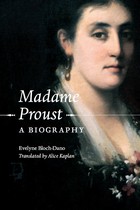
Now Evelyne Bloch-Dano’s touching biography acquaints Proust fans with the real Jeanne Weil Proust. Written with the imaginative force of a novel, but firmly grounded in Jeanne and Marcel Proust’s writings, Madame Proust skillfully captures the life and times of Proust’s mother, from her German-Jewish background and her marriage to a Catholic grocer’s son to her lifelong worries about her son’s sexuality, health problems, and talent. As well as offering intimate glimpses of the Prousts’ daily life, Madame Proust also uses the family as a way to explore the larger culture of fin-de-siècle France, including high society, spa culture, Jewish assimilation, and the Dreyfus affair. Throughout, Bloch-Dano offers sensitive readings of Proust’s work, drawing out the countless interconnections between his mother, his life, and his magnum opus.
Those coming to In Search of Lost Time for the first time will find in Madame Proust a delightful primer on Marcel Proust’s life and times. For those already steeped in the pleasures of Proust, this gem of a biography will give them a fresh understanding of the rich, fascinating background of the writer and his art.

With Loti’s financial and artistic success came notoriety, which he delighted in enhancing by staging elaborate costume balls—to which (as one does) he invited the photographic press. The artistically inclined royalty of his day, including Princess Alice of Monaco and Queen Elizabeth of Rumania, sought him out as confidant. Sarah Bernhardt had him write plays for her. And although his parties and hobnobbing with titled nobility hurt his standing as a serious author in his later years, they can do nothing to diminish the legacy of an artist whom Henry James hailed as a “remarkable genius,” “the companion, beyond all others, of my own selection,” and whose writing led Willa Cather to confess “she would swoon with joy if anyone saw traces of Loti in her work.”
READERS
Browse our collection.
PUBLISHERS
See BiblioVault's publisher services.
STUDENT SERVICES
Files for college accessibility offices.
UChicago Accessibility Resources
home | accessibility | search | about | contact us
BiblioVault ® 2001 - 2025
The University of Chicago Press





